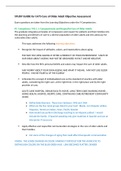STUDY GUIDE for C475 Care of Older Adult Objective Assessment
Exam questions are taken from the Learning Objectives under the 9 Competencies:
#1 Competency 742.1.1: Compassionate and Respectful Care of Older Adults
The graduate integrates principles of compassion and respect for patients and their families into
the planning and delivery of care to a diverse population of older adults and into advocacy for vulnerable older adults.
This topic addresses the following learning objectives :
Recognize the impact of attitudes, values, and expectations about aging.
THE WAY YOU VIEW AGEING IF OFTEN A PRODUCT OF YOUR ENVIRONMENT. MANY OF OUR IDEAS ABOUT AGEING MAY NOT BE GROUNDED IN FACT AND BE NEGATIVE.
Describe how the RN’s personal beliefs and values may impact the care of older adults.
MAY WORRY ABOUT YOUR OWN AGEING AND WHAT IT MEANS. MAY NOT LIKE OLDER PEOPLE. MAY BE FEARFUL OF THE ELDERLY
Articulate the concept of individualized care as the standard of practice with older adults, considering the right care, at the right time, in the right place and by the right provider of care.
ACUTE CARE HOSPITAL, REHAB FACILITY , HOME, LONG TERM CARE (NURSING HOME) , HOME HEALTH, HOSPICE, RESPITE CARE, CONTINUING CARE RETIREMENT COMMUNITY (CCRC)
Define Baby Boomers Those born between 1946 and 1964
What are the five racial groups listed in your text? Blacks, non Hispanic whites, Hispanics, American Indian, Asian, Pacific Islander
How would you perform discharge teaching to an Hispanic patient I would include the family. If Spanish speaking only give materials in Spanish and use an interpreter if necessary
Apply effective and respectful communication strategies in the care of older adults and their families.
List some of the changes of aging that could affect therapeutic communication
VISION; THE LENDS CHANGES IN COLOR, MAKING IT DIFFICULT FOR THE AGING EYE TO DISTINGUISH COLORS ON THE BLUE-GREEN HUE. LENS BECOMES FLATTER, DENSER DECREASING THE ABILITY TO ACCOMMODATE. PUPILLARY RELEX SLOWS MAKING IT MORE DIFFICULT TO SEE IN LOWER LIGHT, CATARACTS. TREATMENT: POSITION OBJECTS WITHIN THEIR
VISUAL FIELD, INCLUDING YOURSELF WHEN SPEAKING TO THEM. GIVE THEM VERBAL INDICATIONS OF YOUR ACTIONS SO AS NOT TO STARTLE THEM. REDUCE UNNEECESSARY CLUTTER.
HEARING: LOSS OF SENSITIVITY TO PITCH, POOR WORK RECOGNITION, HEARING LOSS,. TREATMENT: DO NOT SHOUT, PROJECT YOUR VOICE FROM THE DIAPHRAGM MAKING IT DEEPER, MAKE USE OF THE PERSONS OTHER UNIMPAIRED SENSES. STAND IN FRONT OF THE PERSON SO THEY CAN LIP READ, USE GESTURES, SPEAK TO GOOD EAR, LIMIT BACKGROUND NOICE, USE SHORT SENTENCES AND SPEAK CLEARLY , WRITE IT
SPEECH: DECREASED SALIVA PRODUCTION, LOSS OF TEETH DYSARTHRIA(DISTURBED ARTICULATION CAUSED BY DISTURBANCE IN THE CONTROL OF SPEECH MUSCLES) APHASIA, TREATMENT: RELAXING ENVIRONMENT, MAKE EYE CONTACT, POSITION YOURSELF IN CLOSE JPROXIMITY , FACIAL EXPRESSIONS AND BODY LANGUAGE, USE SHORT UNCOMPLICATAED SENTENCES, CONSTANTLY REPHRASING, DO NOT CORRECT THE ELDER AND BE RESPECTFUL
TOUCH: RECUCTION IN NUMBER OF RECEPTOR,, DECREASE BLOOD FLOOW, REDUCED TACTILE AND VIBRATION SENSATIONS TREATMENT: HAVE THEM REVERT TO ENJOYABLE ACTIVITIES THAT CAPITALIZE ON STRENGTHS AND ABILITIES THEY HAVE MAINTAINED. MOVEMENT: DECREASED BODY STRENGTH TREATMENT: USE ASSISTIVE DEVICES, PILL ORGANIZER, CLOTHES WITH LARGE BUTTONS, HANDRAILS COGNITIVE: DECLINE IN INFO PROCESSING SPEED, DIVIDED ATTENTION, SHORT TERM MEMORY
TREATMENT: BE CALM AND REASSURING, DO NOT SHOUT, FACE THE PERSON AND SPEAK SLOWLEY , GENTLE TOUCH, EYE LEVEL WITH THE PERSON, ORIENTING THE PERSON, REFER TO PERSON BY NAME, ELIMINATE BACKGROUND NOICE, BREAK TASKS INTO SMALL MANAGEABLE STEPS, SIMPLE DIRECTIONS, TELL PERSON WHAT YOU ARE PLANNING TO DO AND REPEAT IT, ENCOURAGE PERSON TO DO AS MUCH AS THEY CAN, PRAISE EFFORTS, PHYSCHOLOGICAL: SAME SATISFACTION AS YOUNGER ADULTS: MAY BE DEPRESSED. Note the ways to communicate or assist a patient with disabilities such as hearing deficits, vision impairments, or aphasia and dysarthria. Be familiar with the types of hearing devices. How should you address the older adult during therapeutic communication? HEARING DEVICES; (ALD) ASSISTIVE LISTENING DEVICE IS ANY TYPE OF DEVICE THAT CAN HELP A PERSON FUNCTION BETTER IN DAY TO DAY LIING. MAY BE USED WITH OR WITHOUT A HEARING AID. HEARING AIDS: (BTE) BEHIND THE EAR. 1 INCH LONG. DELIVERS AMPLIFIED SOUND INTO THE EAR CANAL. ADJUSTABLE VOLUME AND BATTERY POWERED. SUITABLE FOR INTIRE RANGE OF HEARING LOSS.
(OTE) OVER THE EAR: VERY SMALL AND SITS ON TOP OF THE OUTER EAR
(ITE) IN THE EAR: CUSOM FITTED, MOLDED TO CONTOUR OF OUTER EAR. ADJUSTABLE VOLUME, BATTERY , GOOD FOR MILD HEARING LOSS. SOME USERS HAVE DIFFICULTY SEEING OR MANIPULATING THE CONTROL AND BATTERY
(ITC) IN THE CANAL: TINY DEVICES FIT INTO EAR CANAL. CUSOMIZED, THEIR SMALL SIZE
CAN BE A DRAWBACK FOR SOME PEOPLE
(CIC) COMPLETELY IN THE CANAL: THE SMALLEST TYPE OF DEVICE IN THE EAR CLASS. FITS WITHING THE CANAL. MOST EXPENSIVE, SMALL SIZE IS A DISADVANTAGE BECAUSE OF DIFFICULTY IN HANDLING.
Know the abbreviations or acronyms, such as AAC. Know which hearing aids cover the widest range of hearing loss. See the box on Types of Hearing Aids in chapter 5. Both hearing aids and AAC will be mentioned again in Chapter 16.
(AAC) AUGMENTATIVE AND ALTERNATIVE COMMUNICATION: A GROUP OF COMPONENTS INCLUDING SYMBOLS, AIDS, STRATEGIES AND TECHNIQUES USED BY PEOPLE TO ENHANCE COMMUNICATION. RANGE FROM SIMPLE, LOW TECH DEVICES SUCH AS ALPHABET OR HIGH TECH SUCH AS COMPUTER DEVICES THAT RECORD AND STRANSLATE THE SPOKEN WORK INTO PRINT. Make sure you understand what patients could benefit from the use of the AAC.
PATIENTS WITH DYSARTHRIA
Understand what things can occur to make it difficult to communicate
Which type of hearing aid covers the entire range of hearing loss?
What factors in a diverse aging population affect communication? PHYSICAL CHANGES FROM NORMAL AGING AS WELL AS THOSE ASSOC. WITH DISEASE PROCESS.




